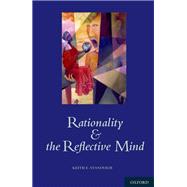
Note: Supplemental materials are not guaranteed with Rental or Used book purchases.
Purchase Benefits
What is included with this book?
| Dual-Process Theory and the Great Rationality Debate | p. 3 |
| The Great Rationality Debate | p. 6 |
| Individual Differences in the Great Rationality Debate | p. 10 |
| Dual-Process Theory: The Current State of Play | p. 16 |
| Properties of Type 1 and Type 2 Processing | p. 19 |
| Dual-Process Theory and Human Goals: Implications for the Rationality Debate | p. 22 |
| The Rest of This Book: Complications in Dual-Process Theory and Their Implications for the Concepts of Rationality and Intelligence | p. 25 |
| Differentiating the Algorithmic Mind and the Reflective Mind | p. 29 |
| Unpacking Type 2 Functioning Using Individual Differences | p. 31 |
| Cognitive Ability and Thinking Dispositions Partition the Algorithmic and the Reflective Mind | p. 35 |
| Intelligence Tests and Critical Thinking Tests Partition the Algorithmic from the Reflective Mind | p. 39 |
| Thinking Dispositions as Independent Predictors of Rational Thought | p. 43 |
| The Key Functions of the Reflective Mind and the Algorithmic Mind that Support Human Rationality | p. 47 |
| So-Called ôExecutive Functioningö Measures Tap the Algorithmic Mind and Not the Reflective Mind | p. 56 |
| The Tri-Process Model and Serial Associative Cognition | p. 61 |
| The Cognitive Miser and Focal Bias | p. 65 |
| Converging Evidence in the Dual-Process Literature | p. 72 |
| The Master Rationality Motive and the Origins of the Nonautonomous Mind | p. 81 |
| Metarepresentation and Higher-Order Preferences | p. 81 |
| What Motivates the Search for Rational Integration? | p. 86 |
| The Master Rationality Motive as a Psychological Construct | p. 87 |
| Evolutionary Origins of the Master Rational Motive and Type 2 Processing | p. 90 |
| A Taxonomy of Rational Thinking Problems | p. 95 |
| Dual-Process Theory and Knowledge Structures | p. 95 |
| The Preliminary Taxonomy | p. 98 |
| Heuristics and Biases Tasks in Terms of the Taxonomy | p. 104 |
| Multiply-Determined Problems of Rational Thought | p. 112 |
| Missing Input from the Autonomous Mind | p. 115 |
| Intelligence as a Predictor of Performance on Heuristics and Biases Tasks | p. 121 |
| Intelligence and Classic Heuristics and Biases Effects | p. 125 |
| Belief Bias and Myside Bias | p. 135 |
| Why Thinking Biases Do and Do Not Associate with Cognitive Ability | p. 139 |
| Cognitive Decoupling, Mindware Gaps, and Override Detection in Heuristics and Biases Tasks | p. 145 |
| Rationality and Intelligence: Empirical and Theoretical Relationships and Implications for the Great Rationality Debate | p. 155 |
| Intelligence and Rationality Associations in Terms of the Taxonomy | p. 155 |
| Summary of the Relationships | p. 163 |
| Individual Differences, the Reflective Mind, and the Great Rationality Debate | p. 164 |
| Skepticism About Mindware-Caused Irrationalities | p. 170 |
| The Social Implications of Separating the Concepts of Intelligence and Rationality | p. 175 |
| Broad Versus Narrow Concepts of Intelligence | p. 175 |
| Intelligence Imperialism | p. 178 |
| Intelligence Misidentified as Adaptation and the Deification of Intelligence | p. 183 |
| Strategies for Cutting Intelligence Down to Size | p. 185 |
| Society's Selection Mechanisms | p. 186 |
| The Assessment of Rational Thought | p. 191 |
| A Framework for the Assessment of Rational Thinking | p. 191 |
| Operationalizing the Components of Rational Thought | p. 194 |
| The Future of Research on Individual Differences in Rational Thought | p. 245 |
| References | p. 247 |
| Author Index | p. 303 |
| Subject Index | p. 319 |
| Table of Contents provided by Ingram. All Rights Reserved. |
The New copy of this book will include any supplemental materials advertised. Please check the title of the book to determine if it should include any access cards, study guides, lab manuals, CDs, etc.
The Used, Rental and eBook copies of this book are not guaranteed to include any supplemental materials. Typically, only the book itself is included. This is true even if the title states it includes any access cards, study guides, lab manuals, CDs, etc.